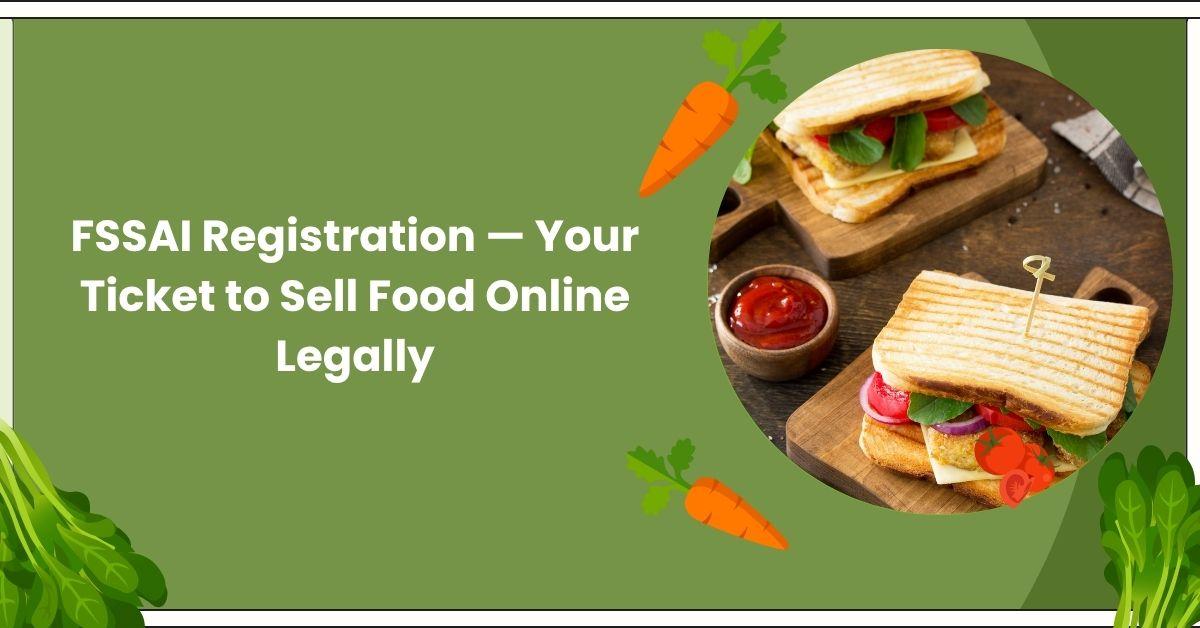In today’s digital world, selling food online has become one of the fastest-growing business opportunities. From homemade snacks to full-fledged cloud kitchens, thousands of entrepreneurs are taking their food brands online. But before you launch your food business on platforms like Swiggy, Zomato, or Amazon Pantry, there’s one crucial step you must take: FSSAI Registration.
FSSAI (Food Safety and Standards Authority of India) registration is mandatory for anyone involved in food manufacturing, processing, packaging, storage, or distribution, including those selling food online. It ensures your products are safe, hygienic, and approved by the government, giving your customers confidence and your business legal protection.
1. What is FSSAI Registration?
The FSSAI Registration is an official approval given by the Food Safety and Standards Authority of India to food businesses, ensuring they meet all food safety regulations. It applies to all kinds of food-related businesses — whether you run a home-based bakery, restaurant, online food delivery service, or packaged goods company.
The registration is done through the FSSAI online portal, where food business operators (FBOs) can apply based on their turnover, business size, and type of operations.
Once registered, the business receives a 14-digit FSSAI license number, which must be printed on all food packaging and displayed at the business premises.
2. Why FSSAI Registration is Essential for Selling Food Online
If you are planning to sell food online, FSSAI registration is not optional — it’s a legal requirement.
Here’s why it matters:
-
Builds Customer Trust: An FSSAI license assures customers that your food meets government-approved hygiene and quality standards.
-
Mandatory for Online Platforms: E-commerce food delivery platforms like Swiggy, Zomato, and Amazon Pantry require sellers to have a valid FSSAI license to list their products.
-
Avoid Legal Penalties: Operating without an FSSAI license can lead to fines, penalties, and even closure of your business.
-
Enhances Brand Credibility: FSSAI certification helps your business appear more professional and reliable in the eyes of customers and investors.
-
Ensures Food Safety Compliance: It helps maintain hygiene standards and prevents contamination or quality issues.
3. Who Needs FSSAI Registration for an Online Food Business
Any individual or company involved in selling, manufacturing, packaging, or distributing food products — even from home — must have FSSAI registration.
This includes:
-
Home-based food sellers
-
Cloud kitchens and catering businesses
-
Packaged food manufacturers
-
Food delivery startups
-
Online grocery sellers
-
Food export and import businesses
-
Restaurants and cafés using online platforms
Whether you are selling via your own website or third-party apps, FSSAI registration is compulsory for legal operation.
4. Types of FSSAI Registration and Eligibility
FSSAI registration is categorized based on business size and annual turnover:
1. Basic FSSAI Registration
-
Who can apply: Small or home-based food businesses
-
Turnover limit: Up to ₹12 lakh
2. State FSSAI License
-
Who can apply: Medium-sized food businesses
-
Turnover limit: ₹12 lakh to ₹20 crore
3 . Central FSSAI License
-
Who can apply: Large or export-oriented food businesses
-
Turnover limit: Above ₹20 crore or operating in multiple states
5. How to Apply for FSSAI Registration Online
The FSSAI registration process is simple and can be completed online through the FSSAI Portal.
Here’s how:
-
Visit the Official Website: Go to the official FSSAI registration website to start your application.
-
Enter Your Details: Fill in basic information like your name, phone number, email, business name, address, and the type of food you handle.
-
Upload Your PAN Card: Take a clear photo of your PAN card and upload it as part of the form.
-
Review and Submit: Double-check all the details you’ve entered. Once everything looks correct, hit the "Submit" button.
-
Make the Payment: Pay the required fee online through UPI, debit/credit card, or net banking. The fee depends on the size and type of your business.
-
Verify with OTP Call: You’ll receive a phone call to verify your mobile number. Share the OTP (one-time password) you receive.
-
Inspection(If Required): In some cases, an FSSAI officer might visit your business location to check hygiene and cleanliness.
-
Get Your License: After processing, your FSSAI registration/license number will be sent to your registered email ID.
6. Benefits of Getting FSSAI Registration
Obtaining an FSSAI license not only fulfills legal requirements but also provides several business benefits:
-
Legal Authorization: Operate your food business legally across India.
-
Customer Confidence: Displaying an FSSAI logo builds trust and transparency.
-
Expansion Opportunities: Helps you list your business on e-commerce platforms.
-
Business Growth: Attracts investors and partners due to government compliance.
-
Export Opportunities: FSSAI certification helps you meet international food safety standards.
-
Quality Assurance: Ensures your food handling and packaging meet hygiene norms.
Also Read: FSSAI license for Restaurants – Documents and process
Conclusion
In the booming online food industry, FSSAI registration is more than a legal formality — it’s a badge of trust and quality assurance. Whether you are a small home-based seller or a growing cloud kitchen, having an FSSAI license helps you sell food online legally, safely, and confidently.
So, if you’re planning to start your online food business, make FSSAI registration your first step. It’s quick, affordable, and essential to ensure that your business not only thrives but also earns customer trust and government approval.

